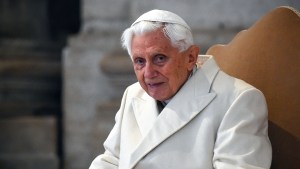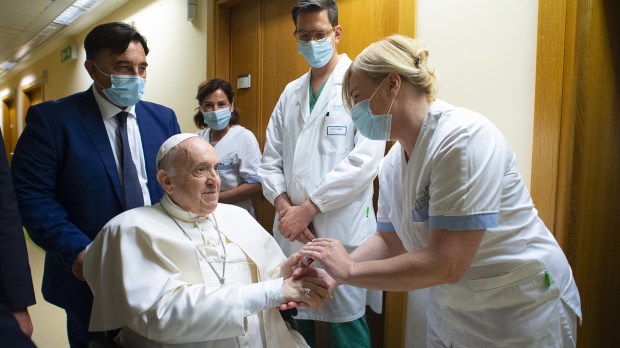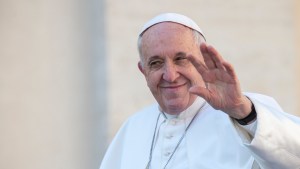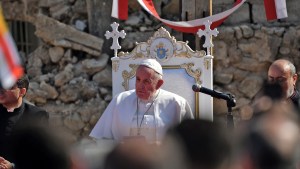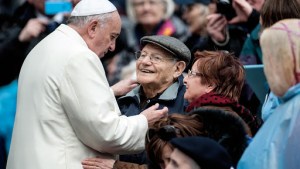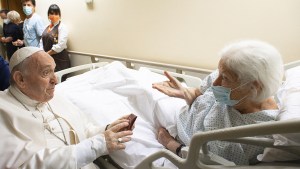Against the backdrop of the Covid-19 pandemic, the year 2021 has had its challenges for Pope Francis in terms of his personal health. As he prepares to celebrate his 85th birthday on December 17, 2021, the Pontiff has just lived through a demanding year during which he was hospitalized for 10 days at Gemelli Hospital for a scheduled surgery.
On January 1, the Pontiff’s year began badly: his ongoing sciatica pain forced him to cancel liturgical celebrations and to postpone the traditional address to the diplomatic corps. Sciatic pain has affected Pope Francis for many years. It goes hand in hand with the Pope’s limp, which is apparent whenever he walks.
The Pontiff seemed to recover soundly from this delicate beginning of the year. On January 14, he received his first dose of the COVID-19 vaccine. This announcement was preceded by a public plea in favor of vaccination: “I believe that, from an ethical point of view, everyone should take the vaccine,” he announced on Italian television. On February 3, he received his second dose.
A recommended operation
The question of the Pope’s health came up again at the beginning of the summer. On Sunday, July 4, a few hours after the traditional Angelus prayer from the window of the Apostolic Palace, the Holy See announced that the Pontiff would be hospitalized at Gemelli Hospital.
Pope Francis, it was learned, was undergoing surgery for a “symptomatic diverticular stenosis of the colon,” a common operation for a person of his age but, like all operations for the elderly, it can be delicate.
The operation, the first of this kind for the Pontiff, had been planned in advance by the Holy See. This news naturally raised concerns about the health of the head of the Catholic Church. In the public eye, Gemelli remains strongly associated with the highly publicized illness of John Paul II in 2005 – even though he did not die there.
Ten days of recovery
Pope Francis remained in the Roman hospital for ten days – longer than initially planned – even reciting the Angelus from the balcony of the facility on July 11. During these ten days, health bulletins were closely scrutinized by the international press. This atmosphere generated many rumors about a decline in the Pope’s health.
The lessening of activities over the summer — even while this pope does not leave Rome as previous popes have done for a good portion of the hot summer months — naturally left the media able to question. During the summer, some who follow the Vatican even initiated a debate on the need to reform the rules of the conclave. In a book published in the fall, an Italian Vatican expert, Francesco Antonio Grana, went so far as to suggest that the Church was now in a “pre-conclave period.”
A complicated remission
“Whenever a pope is ill, there is always a breeze or a hurricane of conclave,” said Pope Francis in his first post-operative interview with the Spanish radio station COPE on August 30, 2021. The Pontiff nevertheless acknowledged the extent of the operation he had undergone two months earlier.
He said that he could now “eat everything,” but admitted that this had not been possible for some time before the operation. And he said he was still under post-operative medication, “because the brain must register that it has 33 centimeters less of intestine,” he stressed. But he concluded: “Apart from that, I have a normal life, I lead a completely normal life.”
“Iron health”
Pope Francis did show signs of fatigue after his grueling October 5-8 trip to Iraq. “I confide in you that on this trip I was much more tired than on others,” he told reporters at the in-flight press conference on his way back to Rome.
This is probably not surprising considering how much this trip implied “trips within the trip” — as well, of course, as the spiritual, emotional, and diplomatic intensity of being in Iraq. On the first full day, he left from Baghdad for two further cities (two more plane trips) before returning for the night to Baghdad. The next day brought two more plane trips and two helicopter trips, before again returning to Baghdad for the night.
Shortly after, the Argentinean doctor and friend of the Pope, Nelson Castro, confirmed the generally strong state of the Pope’s health. The author of a book on the health of popes – who presented an Italian translation of the book in Rome in October – said he had recently met the Pontiff and gave his impression: “He is a man of iron health.”
The book explained that the Pope was acutely aware of the problems linked to his health. In particular, he told him about the serious operations he underwent in his youth, which resulted in the removal of part of one lung. Pope Francis has also praised the care he has received in regards to mental health.
Post-pandemic normal?
The Argentinean doctor also announced that the Pontiff’s sciatica had been treated during the year. The Pope, he said, was perfectly able to travel. An important comparison: in 2012, When Benedict XVI decided to resign, his doctor had recommended avoiding any further long plane trips, such as a transatlantic crossing, for health reasons.
Pope Francis’ two trips in the fall (Hungary-Slovakia and then Cyprus-Greece), as well as the long list of trips planned for 2022 – including some notably far destinations: Congo, East Timor… – seem rather to indicate that Francis’ pontificate is now returning “to normal.”
No fear of death
Normal is a relative normality, however. At 85, Pope Francis is already the 12th oldest pope in history. In 2021, he will have surpassed the age of his predecessor John Paul II when he died and will have reached the age of Benedict XVI when he resigned.
It should be noted that on January 11, the 266th pope lost his personal doctor, Fabrizio Soccorsi, who died of cancer. The physician was replaced in February by Roberto Bernabei.
In his book interview with Nelson Castro, published in February 2021 in Argentina, the Pope explained that he thought he would die in Rome and not in his country. And he said he was “not at all” afraid of death.
